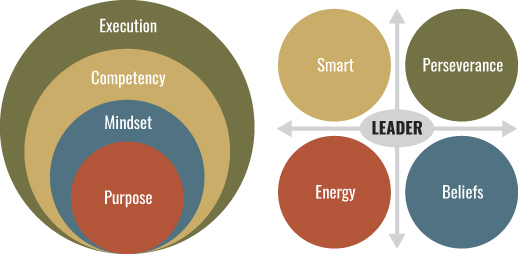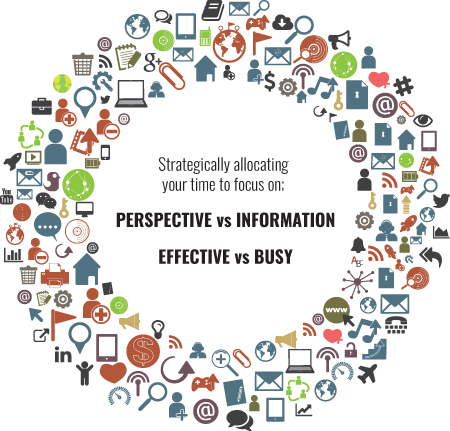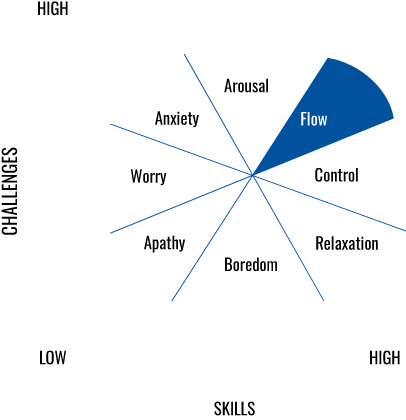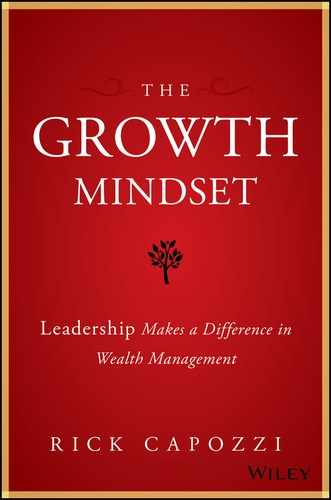Chapter 19
Getting Into Flow
“Your vision will become clear only when you look into your heart. Who looks outside, dreams. Who looks inside, awakens.”
—Carl Jung
In order to achieve optimal performance, regularly ask yourself, “Am I running the business, or is the business running me? Am I still having fun? Am I being challenged? Have I just become complacent?” Advisors are often asked to put together a business plan outlining their vision, overall plan, strategy, and tactics for attracting clients and assets. It would be wiser if advisors were asked to put together a life plan, one that would include the impact of their business on their personal, social, and spiritual life.
Ask yourself:
- What do I value most in life?
- What drives me?
- What principles guide my decisions?
- What do I ultimately want to achieve in my life?
- What's my mission in life?
- What's my vision of my future?
- What inspires me?
- Am I living my life or am I still living the life one of my parents wanted? (Set yourself free and seek a new challenge.)
Creating a life plan helps you keep all aspects of who you are in perspective and allows you to measure your performance based on truly important goals. Naturally, you should adjust your life accordingly when those objectives aren't met, but it's also essential to reward yourself and your family when you do attain your goals.
What Is Success to You?
“Don't aim at success. The more you aim at it and make it a target, the more you are going to miss it. For success, like happiness, cannot be pursued; it must ensue, and it only does so as the unintended side effect of one's personal dedication to a cause greater than oneself or as the by‐product of one's surrender to a person other than oneself. Happiness must happen, and the same holds for success: you have to let it happen by not caring about it.”
—Victor E. Frankl
Success means different things to different people. You may measure success by wealth, performance, fulfillment, or some combination of all three. Wealth is not just money. It is a mindset. It is a set of thoughts. When you maintain a balance at home, in personal relationships, in your health, and at work, you have created an optimal foundation for wealth‐driven performance. You now have the right energy.
If you approach difficulties with a balanced perspective, you will be able to weather them more easily and succeed over the long haul. Advisors who have been in the business for a number of years understand the industry can be an emotional rollercoaster with many ups and a fair number of downs. Over the years, the business makes you wiser and humbler—if you learn from your mistakes. Some advisors seek the support of other advisors, managers, or mentors to discuss their challenges and life goals and keep their overall perspective in balance.
It all begins with purpose. Once you define your purpose, the purpose will serve as your ongoing energy and motivation. Once that is clearly defined, you move to your mindset, which is your belief system, to competency, which is your expertise, and then to execution, which is how you persevere.

Discovering Your Purpose
Stay Grounded
Remember what is, is, and what is not, is not. For many successful advisors, this is the mantra that changes—or grounds—their lives. In other words, they understand what they can control and what they cannot. They also understand the difference between cause and effect and the difference between making things happen versus allowing things to happen to you. Stephen Covey said it best: “I am not the product of my circumstances. I'm a product of my decisions.” Getting emotional about situations or circumstances you cannot do anything about is a waste of good energy and time. With so much information at our disposal, both as advisors and clients we need perspective and know‐how to effectively manage our time and avoid falling into the black hole of data overload.

Brain Hacking
“The only person over whom you have direct and immediate control is yourself. The most important assets to develop, preserve and enhance, therefore, are your own capabilities. And no one can do it for you—you must cultivate the habits of leadership effectiveness for yourself—and doing so will be the single best investment you'll ever make.”
—Stephen R. Covey
Keep Your Head in the Game
The most successful advisors derive great satisfaction from what they do. In part, this is because they often perform their work in a state of optimal performance, what psychologist Mihaly Csikszentmihalyi calls “flow.”
Csikszentmihalyi defines flow as being fully absorbed in an activity to the point where one's sense of time is lost and feelings of great satisfaction are experienced. If you are performing in flow, you have a sense of energized focus in which one thought follows another quickly and effortlessly and you experience full involvement and a feeling that you are using your skills to the utmost. Clearly, it is an immensely fulfilling place to be. If you strive to achieve your own flow, you will discover what truly makes you happy and what specific activities help you maintain your flow.
Notably, flow occurs when both the challenges experienced and the level of skill necessary to meet or overcome them are high.

Optimal Performance Occurs When Both Variables Are High
Source: Massimini & Carli; Csikszentmihalyi (1990)
Symbiosis
Clearly, achieving real success requires a symbiotic relationship between your work and personal life. Overlooking the effect your personal life has on your business is shortsighted. Equally important, you should share your life plan with those around you who have a direct effect on your well‐being so they understand what you are trying to achieve. Family support is vital. Your loved ones have a vested interest in your success. By respecting the balance between your work life and your personal life, you can achieve a greater measure of physical, emotional, and spiritual harmony and enjoy even greater satisfaction and success.
Advice for the New Advisor
- Start with your vision: Who are you? What do you hope to accomplish?
- Be honest with yourself and others. Live your life, not someone else's.
- Be conscious of your beliefs and biases—they may be holding you back.
- Discover your talent as an advisor and become the best you can be.
- The law of proximity: find people who can help you and learn from them. You cannot get to the right place being around the wrong people.
- Persistence, heart, and the right attitude will give you a competitive advantage.
- Play with confidence and always look to improve and build competencies.
- Be enthusiastic and positive, especially after a letdown. Have the courage to get back up.
- Build a large network and be seen as a giver. It will serve you well.
- Understand that happiness is not based on possessions, power, prestige, or fame.
- Take full responsibility for your success and your decisions. You create, promote, and allow what goes on in your environment. Don't be a victim of circumstance. Don't ever tolerate a bad environment and bullies.
- Be forgiving of yourself and others. You will make mistakes. Learn and move on. Don't allow yourself to be defined by the past.
- Become an effective communicator with a high level of emotional intelligence.
- Be grateful, compassionate, and generous. You will never win the more game.
- Have a sense of curiosity and be inspired to learn every day.
- Find the right mentors. The best mentors ask lots of questions and listen well.
- Always put your clients' interest before everyone else's. But never compromise your integrity.
